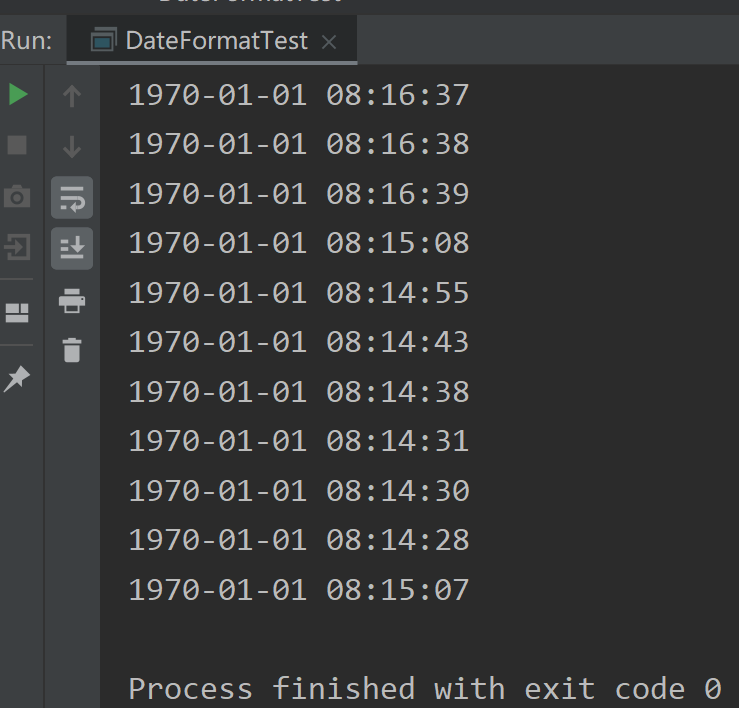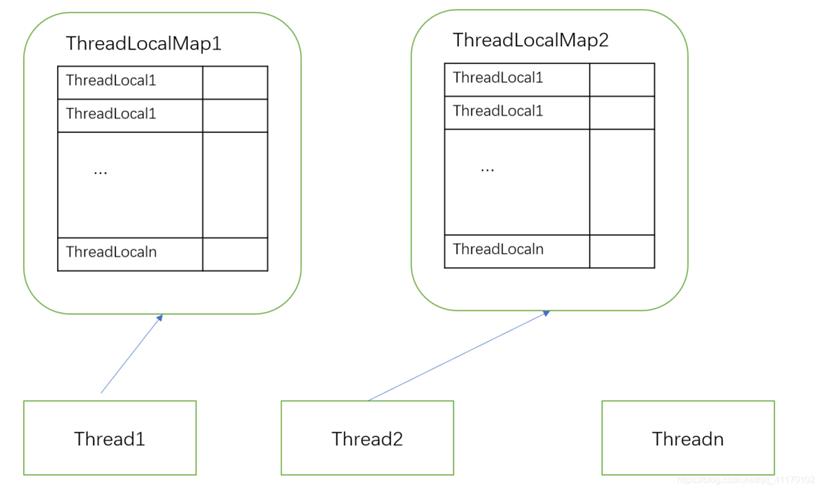- 联系我们
- duidaima.com 版权声明
- 闽ICP备2020021581号
-
 闽公网安备 35020302035485号
闽公网安备 35020302035485号
 闽公网安备 35020302035485号
闽公网安备 35020302035485号
public class MyThreadLocal {
private static SimpleDateFormat sdf = new SimpleDateFormat("yyyy-MM-dd hh:mm:ss");
public static String date(int seconds) {
Date date = new Date(1000 * seconds);
return sdf.format(date);
}
public static void main(String[] args) {
// 堆代码 duidaima.com
ExecutorService executorService = Executors.newFixedThreadPool(10);
for (int i = 0; i < 1000; i++) {
int finalI = i;
executorService.execute(new Runnable() {
@Override
public void run() {
String date = date(finalI);
System.out.println(date);
}
});
}
executorService.shutdown();
}
}
这里为了提高性能,所以将 SimpleDateFormat 作为 static 属性,多线程共享,但是这样就会出现安全问题,打印结果如下:
public class MyThreadLocal {
private static SimpleDateFormat sdf = new SimpleDateFormat("yyyy-MM-dd hh:mm:ss");
public static String date(int seconds) {
Date date = new Date(1000 * seconds);
String s = null;
synchronized (MyThreadLocal.class) {
s = sdf.format(date);
}
// Date date = new Date(1000 * seconds);
return s;
}
public static void main(String[] args) {
ExecutorService executorService = Executors.newFixedThreadPool(10);
for (int i = 0; i < 1000; i++) {
int finalI = i;
executorService.execute(new Runnable() {
@Override
public void run() {
String date = date(finalI);
System.out.println(date);
}
});
}
executorService.shutdown();
}
}
(2) 用ThreadLocal解决public class MyThreadLocal1 {
// private static SimpleDateFormat sdf = new SimpleDateFormat("yyyy-MM-dd hh:mm:ss");
private static ThreadLocal<SimpleDateFormat> simpleDateFormatThreadLocal = ThreadLocal.withInitial(() -> new SimpleDateFormat("yyyy-MM-dd hh:mm:ss"));
public static String date(int seconds) {
Date date = new Date(1000 * seconds);
SimpleDateFormat sdf = simpleDateFormatThreadLocal.get();
return sdf.format(date);
}
public static void main(String[] args) {
ExecutorService executorService = Executors.newFixedThreadPool(10);
for (int i = 0; i < 1000; i++) {
int finalI = i;
executorService.execute(new Runnable() {
@Override
public void run() {
String date = date(finalI);
System.out.println(date);
}
});
}
executorService.shutdown();
}
}
打印结果:
/**
* 避免传递参数的麻烦
* ThreadLocalan案例2
* @ 堆代码 duidaima.com
* @since 1.0.0
*/
public class ThreadLocalNormalUsage06 {
public static void main(String[] args) {
new Service1().process();
}
}
class Service1 {
public void process() {
User user = new User("周星驰");
UserContextHolder.holder.set(user);
new Service2().process();
}
}
class Service2 {
public void process() {
User user = UserContextHolder.holder.get();
System.out.println("service2:" + user.name);
UserContextHolder.holder.remove();
UserContextHolder.holder.set(new User("古天乐"));
new Service3().process();
}
}
class Service3 {
public void process() {
User user = UserContextHolder.holder.get();
System.out.println("service3:" + user.name);
}
}
class UserContextHolder {
public static ThreadLocal<User> holder
= new ThreadLocal<>();
}
class User {
String name;
public User(String name) {
this.name = name;
}
}
打印结果:
.在任何方法中都可以直接获取到对象;

/**
* Returns the current thread's "initial value" for this
* thread-local variable. This method will be invoked the first
* time a thread accesses the variable with the {@link #get}
* method, unless the thread previously invoked the {@link #set}
* method, in which case the {@code initialValue} method will not
* be invoked for the thread. Normally, this method is invoked at
* most once per thread, but it may be invoked again in case of
* subsequent invocations of {@link #remove} followed by {@link #get}.
*
* <p>This implementation simply returns {@code null}; if the
* programmer desires thread-local variables to have an initial
* value other than {@code null}, {@code ThreadLocal} must be
* subclassed, and this method overridden. Typically, an
* anonymous inner class will be used.
*
* @return the initial value for this thread-local
*/
protected T initialValue() {
return null;
}
该方法返回当前线程对应的初始值,使用了延迟加载,当调用get()方法是才会触发 /**
* Returns the value in the current thread's copy of this
* thread-local variable. If the variable has no value for the
* current thread, it is first initialized to the value returned
* by an invocation of the {@link #initialValue} method.
*
* @return the current thread's value of this thread-local
*/
public T get() {
Thread t = Thread.currentThread();
ThreadLocalMap map = getMap(t);
if (map != null) {
ThreadLocalMap.Entry e = map.getEntry(this);
if (e != null) {
@SuppressWarnings("unchecked")
T result = (T)e.value;
return result;
}
}
return setInitialValue();
}
方法里面第一行获取当前线程,然后通过 getMap(t) 方法获取 ThreadLocal.ThreadLocalMap,所有的变量数据都存在该 map,map 的具体类型是一个 Entry 数组。然后接着下面获取到 Entry 键值对,注意这里获取 Entry 时参数传进去的是 this,即 ThreadLocal 实例,而不是当前线程 t。如果获取成功,则返回 value 值。/* ThreadLocal values pertaining to this thread. This map is maintained by the ThreadLocal class. */
ThreadLocal.ThreadLocalMap threadLocals = null;
/**
* Get the map associated with a ThreadLocal. Overridden in
* InheritableThreadLocal.
*
* @param t the current thread
* @return the map
*/
ThreadLocalMap getMap(Thread t) {
return t.threadLocals;
}
在 getMap 中,是调用当期线程 t,返回当前线程t中的一个成员变量 threadLocals,类型为 ThreadLocal.ThreadLocalMap。就是上面提到的每一个线程都自带一个 ThreadLocalMap 类型的成员变量。static class ThreadLocalMap {
/**
* The entries in this hash map extend WeakReference, using
* its main ref field as the key (which is always a
* ThreadLocal object). Note that null keys (i.e. entry.get()
* == null) mean that the key is no longer referenced, so the
* entry can be expunged from table. Such entries are referred to
* as "stale entries" in the code that follows.
*/
static class Entry extends WeakReference<ThreadLocal<?>> {
/** The value associated with this ThreadLocal. */
Object value;
Entry(ThreadLocal<?> k, Object v) {
super(k);
value = v;
}
}
ThreadLocalMap 是 ThreadLocal 的一个静态内部类,其内部主要是一个 Entry 数组存储数据(并不是一个 map 类型)。/**
* Sets the current thread's copy of this thread-local variable
* to the specified value. Most subclasses will have no need to
* override this method, relying solely on the {@link #initialValue}
* method to set the values of thread-locals.
*
* @param value the value to be stored in the current thread's copy of
* this thread-local.
*/
public void set(T value) {
Thread t = Thread.currentThread();
ThreadLocalMap map = getMap(t);
if (map != null)
map.set(this, value);
else
createMap(t, value);
}
为这个线程设置一个新值/**
* Removes the current thread's value for this thread-local
* variable. If this thread-local variable is subsequently
* {@linkplain #get read} by the current thread, its value will be
* reinitialized by invoking its {@link #initialValue} method,
* unless its value is {@linkplain #set set} by the current thread
* in the interim. This may result in multiple invocations of the
* {@code initialValue} method in the current thread.
*
* @since 1.5
*/
public void remove() {
ThreadLocalMap m = getMap(Thread.currentThread());
if (m != null)
m.remove(this);
}
删除线程中对应的值,remove()方法也是在ThreadlocalMap中进行操作,传入当前ThreadLocal对象的引用,删除map中的value的值,不是删除整个ThreadLocalMap对象,而是根据this(也就是当前ThreadLocal对象)来删除对应的threadLocal对象 static class Entry extends WeakReference<ThreadLocal<?>> {
/** The value associated with this ThreadLocal. */
Object value;
Entry(ThreadLocal<?> k, Object v) {
super(k);
value = v;
}
}
我们知道,ThreadLocal 是基于 ThreadLocalMap 实现的,这个 Map 的 Entry 继承了 WeakReference,而 Entry 对象中的 key 使用了 WeakReference 封装,也就是说 Entry 中的 key 是一个弱引用类型,而弱引用类型只能存活在下次 GC 之前。public class ThreadLocalNPE {
ThreadLocal<Long> tl = new ThreadLocal();
public void set(){
tl.set(Thread.currentThread().getId());
}
public long get(){
return tl.get();
}
public static void main(String[] args) {
ThreadLocalNPE item = new ThreadLocalNPE();
System.out.println(item.get());
Thread thread = new Thread(new Runnable() {
@Override
public void run() {
item.set();
System.out.println(item.get());
}
});
thread.start();
}
}
打印结果:
